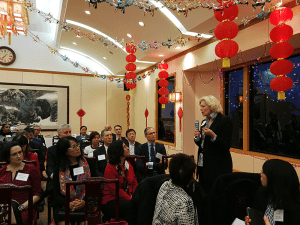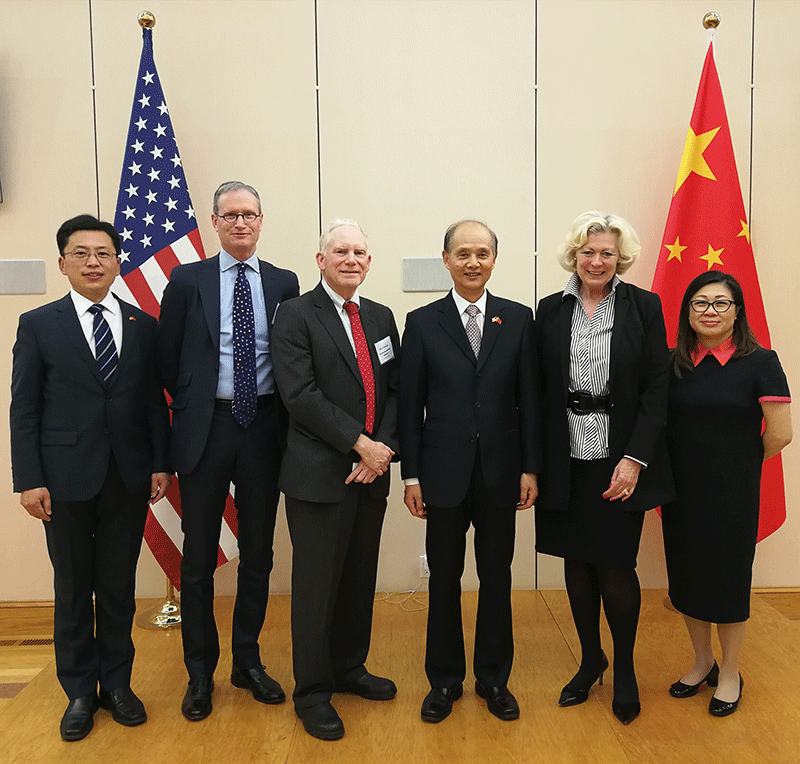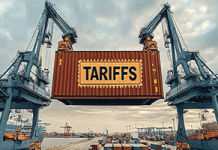 As President Donald R. Trump’s intention of imposing tariffs on $50 billion of exports from China loomed like a cloud, the Chinese Consul General, Ambassador Luo Linquan, hosted a reception and dinner for approximately 30 business leaders at his residence on Wednesday, March 21.
As President Donald R. Trump’s intention of imposing tariffs on $50 billion of exports from China loomed like a cloud, the Chinese Consul General, Ambassador Luo Linquan, hosted a reception and dinner for approximately 30 business leaders at his residence on Wednesday, March 21.
The event focused on foreign direct investment into China, as well as China’s outward foreign direct investment, but the President’s pending actions were the dominant topic.
The Consulate-General of the People’s Republic of China in San Francisco, which also has responsibility for Nevada, Oregon, Washington and Alaska, covers 35% of U.S. trade with China.
Attending the March 21 dinner were Northern California government and business leaders. Representatives of several California Chamber of Commerce member companies were represented, in addition to Susanne T. Stirling, CalChamber vice president of international affairs.

Tariff Negatives
The day following, on Thursday, March 22, President Trump signed a memorandum that imposes retaliatory tariffs on Chinese imports.
The new measures follow a Section 301 Investigation of China’s Laws, Polices, and Practices or Actions related to Technology Transfer, Intellectual Property and Innovation by the U.S. Trade Representative’s Office.
Although the business community recognizes there are serious issues with China’s trade policies and practices, the CalChamber has deep concerns over the impact that increased tariffs could have on international trade and the state’s economy. The tariffs will have adverse consequences and fail to consider the impact on U.S. allies and trading partners.
Raising tariffs can result in higher prices to the consumer for the specific product protected and in limited choices of products for consumers. Further, it can cause a net loss of jobs in related industries, retaliation by U.S. and California trading partners, and violates the spirit of our trade agreements. The end result is that raising tariffs can cause a trade war.

Guest Speakers
Ambassador Linquan welcomed all to the reception and dinner and spoke in positive and optimistic tones about the U.S.-China relationship.
Yihang Yang, economic and commercial counselor for the Chinese consulate, gave an economic report focusing on China’s inbound and outbound investment from 2017. He spoke of China’s policies to attract foreign investment along with China’s capital outflow in terms of quantity, destination and sectors.
Counselor Yihang Yang indicated that China’s President Xi says China will become more and more open; China will promote high-standard liberalization and facilitation of trade and investment; and China will ease market access—protecting the rights and interests of foreign investors. China’s middle income population has reached 400 million and is still growing. Over the next 15 years, China will import US$24 trillion worth of goods; attract US$2 trillion inbound of direct investment; and make US$2 trillion of outbound investment.
International Import Expo
The Deputy Director-General of China’s Ministry of Commerce (MOFCOM) spoke of the November 5–10, 2018 China International Import Expo to be held in Shanghai.
In May 2017, Chinese President Xi Jinping announced at the Belt and Road Forum for International Cooperation that China will hold a China International Import Expo (CIIE) at the National Exhibition and Convention Center in Shanghai. More than 150,000 purchasers are expected to attend. See story
It is a significant move for the Chinese government to hold CIIE to give firm support to trade liberalization and economic globalization and actively open the Chinese market to the world. The expo will facilitate the gathering of representatives of countries and regions all over the world to strengthen economic cooperation and trade, and to promote global trade and world economic growth in order to make the world economy more open.
California-China Relationship
Bruce Pickering, vice president of the Asia Society and executive director of the Asia Society in Northern California, further emphasized the importance of the California-China relationship.
Thilo Hanemann, research director of the Rhodium Group, addressed China’s direct investment in California and its geographic distribution throughout the state, industry dynamics and investor characteristics—and cautioned that bad policy may be getting in the way of business.
He said the U.S.-China relationship may be headed for a volatile period, and that China needs to live up to the concept of openness and transparency.
Trade Relationship
According to the U.S. State Department, China has been one of the world’s fastest-growing economies over the last several years, and its efforts to reform and modernize have helped transform China into a large trading economy. U.S.-China trade has risen rapidly over the last several decades. Total trade in goods between the two nations has increased from $4.8 billion in 1980 to $635.96 billion in 2017. U.S. exports to China in 2017 were approximately $130.37 billion.
In 2017, China continued as California’s third largest export destination, with approximately $16.4 billion in exports. Computer and electronic products accounted for 26.6% of exports, totaling $4.36 billion. Transportation equipment brought in $2.55 billion (15.5%) and nonelectrical machinery brought in $2 billion, accounting for 12.5%. This was followed by waste and scrap with $1.7 billion, 10.4% of exports.
CalChamber Support for Free Trade
The CalChamber continues to pursue a free trade-based agenda in 2018. CalChamber has long supported free trade worldwide, expansion of international trade and investment, fair and equitable market access for California products abroad, and elimination of disincentives that impede the international competitiveness of California business.
According to a California state government international trade and investment study, “International trade and investment is a major economic engine for the state of California that broadly benefits businesses, communities, consumers and state government… California’s economy is more diversified than ever before, and the state’s prosperity is tied to exports and imports of both goods and services by California-based companies, to exports and imports through California’s transportation gateways, and to inflows and outflows of human and capital resources.”
Trade offers the opportunity to expand the role of California’s exports. In its broadest terms, trade can literally feed the world and raise the living standards of those around us.
Although trade is a nationally determined policy issue, its impact on California is immense. California exports to more than 229 foreign markets.
Any rethinking of U.S. trade policies must recognize the gains achieved and ensure that trade remains strong and without interruption.
More Information
Presidential Memorandum
Before the tariffs are implemented, the administration will allow a consultation period to seek input from the business community. The Federal Register notice is expected to be issued next week.
Staff Contact: Susanne T. Stirling


